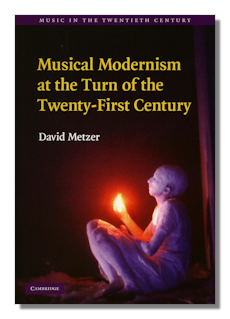
The Internet's Premier Classical Music Source
Related Links
-
Introduction
Acoustics
Ballet
Biographies
Chamber Music
Composers & Composition
Conducting
Criticism & Commentary
Discographies & CD Guides
Fiction
History
Humor
Illustrations & Photos
Instrumental
Lieder
Music Appreciation
Music Education
Music Industry
Music and the Mind
Opera
Orchestration
Reference Works
Scores
Thematic Indices
Theory & Analysis
Vocal Technique
Search Amazon
Recommended Links
Site News
 Book Review
Book Review
Musical Modernism and the Turn of the Twenty-First Century

David Metzer
Cambridge University Press x + 254pp
ISBN-10: 0521517796
ISBN-13: 978-0521517799
Musical Modernism and the Turn of the Twenty-First Century is a general-sounding title. Yet this excellent and readable, if at times closely-packed, book by David Metzer advances a more precise thesis. In other words, this is not the survey that it sounds as though it might be. The book does cover music in the last 30 years, from 1980; and it relies on a certain understanding of and familiarity with what has been written in that time. But Metzer suggests that "Modernism", not "Postmodernism", has remained the defining stylistic, historical and philosophical current at a time when other cultural historians have "written it off". Nor does this view imply either an extension or expansion of what is "Modern", nor a contraction of "Postmodern". Rather a re-assessment of the music (and for that matter literature and the other arts) as it's developing during years to which we are perhaps too close to be as dogmatic as are those who have declared Modernism dead.
The book forms part of, and is a volume in, Cambridge University Press' "Music in the Twentieth Century" series under the overall editorship of Arnold Whittall. As such, it necessarily follows certain praxes… it's scholarly and expects the reader to work at its ideas; it's not afraid to cover specific, specialized, areas; and it's well written! Indeed, Metzer, Professor of Music at the University of British Columbia, has defined his area very well, and followed through with impressive thoroughness.
Metzer's argument is supported by close examination of the works of three contemporary composers, Ligeti, Ferneyhough and Lachenmann. In their music he identifies new concerns, yet concerns that are convincingly demonstrated to be continuous with the music of the greater part of the twentieth century… purity, silence, fragmentation and flux. Since there is little or nothing that is innately "postmodern" about these aesthetics or compositional techniques, it can be argued that (since they can be shown to provide much of the impetus for the new in "new music") they represent an effective renewal, or continuity, of musical vibrancy, and one that shows little sign of attenuation as their characteristics continue to infuse composers' lines of inquiry. These include "spectralism" and the "new complexity".
Replete with musical examples and illustrations where appropriate, the book takes just five chapters contained in under a further 250 pages to examine those "lines of inquiry" (the abstracts and techniques, purity, silence, fragmentation and flux) as explored in the works of the three composers just named in particular, and in the work of a wider cohort of their contemporaries in general. Metzer's unabashed conclusion is that the twentieth century saw no division between and across notional historical boundaries and eras as is usually accepted to have been heralded in by the fin de siècle epoch in the nineteenth century. Metzer is happy (and confident) to call upon critics whose work only partly supports or refutes this thesis – like Adorno, and Marjorie Perloff in the realm of poetry. This is not to say he is dishonestly selective. Rather that their work itself is in a state of flux; indeed, that the arguments against the demise of Modernism as a cultural force continue to evolve. He does demonstrate beyond doubt, though, that the unequivocal proposal of this demise is on the wane.
Metzer puts it as succinctly as any of those whose own arguments he refutes… "The map inferred from some accounts of music since World War Two is marked by a single line, that between modernism and postmodernism. That line does not appear on the map sketched here. There is instead a web of thin lines between individual compositions. The lines reveal the connections that exist between pieces, the distances between them, and the stylistic groupings within the contemporary pluralistic realm" [page 246]. That's a justificable conclusion to follow the specifics of the musical examples throughout the book.
Whether or not you are convinced by this argument (and it's supported expertly throughout the book by examples, clear examinations, closely-reasoned narrative threads, and well-marshaled evidence), at least it's a fruitful one to explore. The text is at times dense, the allusions may require some research. The language is at times appropriately uncompromising. But the temptation to see what is otherwise an arbitrary date-range, that around 2000, as a watershed had better be challenged. And David Metzer does so extremely well. A valuable and persuasive contribution to our understanding of contemporary music, and one with which anyone with any investment in this, our own, musical period, should be familiar.
Copyright © 2010 by Mark Sealey.



















